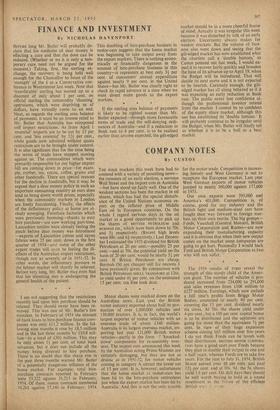COMPANY NOTES
By CUSTOS
THE stock markets this week have had to contend with a variety of unsettling news— the rumours of an early election, a nervous Wall Street and the import cuts in Australia —but have stood up fairly well. One of the weakest sections has been the market in oil shares, which has had the special disturb- ance of the United Nations economic re- port on the inflated price of Middle East oil in European countries. On the whole I regard nerVous days in the oil market as a good opportunity to pick up the shares of BRITISH PETROLEUM and BURMAH OIL, which have been down to 70s. and 51 respectively. (Recent high levels were 88s. and 61 respectively.) Last Decem- ber I estimated the 1955 dividend for British Petroleum at 20.per cent.—possibly 25 per cent.—and at 70s. the potential yield on the basis of 20 per cent, would be nearly 51 per cent. If British Petroleum are cheap. Burmah Oil are cheaper still for reasons 1 have previously given. By comparison with British Petroleum SHELL TRANSPORT at 126s. to yield under 4f per cent, on the estimated 15 per cent. tax free look dear.
• Motor shares were marked down on the Australian news. Last year the British motor industry exported about half its pro- duction of over 1,000,000 vehicles and 130,000 tractors. It is, in fact, the world's largest exporter of motor vehicles with an overseas trade of about £340 million. Australia is its largest overseas market, im- porting last year 121,000 British motor vehicles—partly in the form , f 'knocked- down' components for re-assembly over- seas. The import cuts announced this week by the Australian acting Prime Minister are certainly damaging, but they are not as drastic as in 1951-52, for motor vehicles coming in category A attract the lower cut of 15 per cent. It is, however, unfortunate that the home market in motor-cars has been hit by the hire-purchase restrictions just when the export market has been hit by Australia. And this is not the only trouble for the motor trade. Competition is increas- ing fiercely and West Germany is out to recapture the European market. Last year West German exports of motor vehicles jumped to nearly 300,000 against 177,000 in 1953.
Our own exports were 593,000 and America's 401,000. Competition is, of course, good for any industry and the British light and medium-sized cars have fought their way forward in foreign mar- kets on their own merits. The big groups— Fords, Vauxhall (General Motors), British Motor Corporation and Rootes—are now expanding their manufacturing capacity and it is obvious that when their new output comes on the market some companies are going to get hurt. Personally I would back Ford and British Motor Corporation as,two who will not suffer.
The 1954 results of FORD reveal the strength of this sturdy child of the Ameri- can giant. The number of vehicles it pro- duced increased from 234,000 to 291,000 and sales revenues from £106 million to £127 million. Earnings, Which now include a full year's profits from Briggs Motor Bodies, amounted to nearly 90 per cent. covering the 15 per cent, dividend nearly six times. At 76s. the shares yield under 4 per cent., but a 100 per cent. capital bonus is to be distributed and the optimists are going for more than the equivalent 71 per cent. In view of their huge expansion scheme costing £65 million over five years I do not think Fords can be lavish with their distribution. BRITISH MOTOR CORPORA- TION have a good start over Fords because they plan to double their output in one and a half years, whereas Fords are to take live years. For the year to July 31, 1954, British Motor earned oVer 48 per cent. and paid 121 per cent, and at 10s. 9d. the 5s. shares yield 5.8 per cent. On dull days they should be well worth buying to hold as a sound investment in the future of the efficient British n'B.1 rI•:.er,


































 Previous page
Previous page